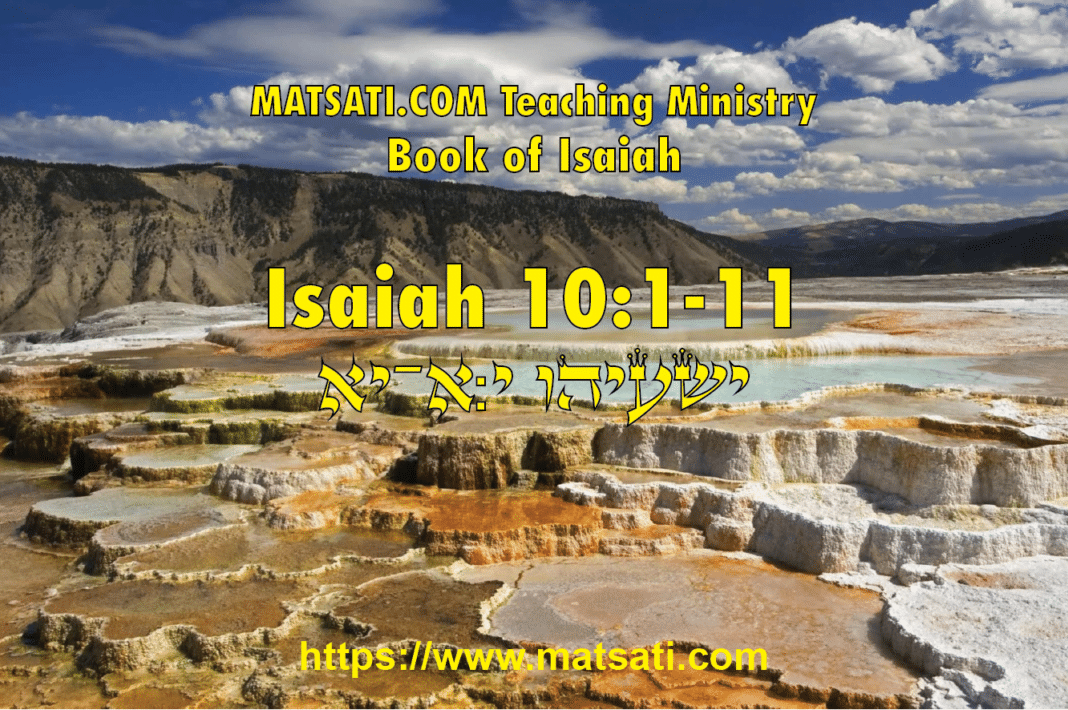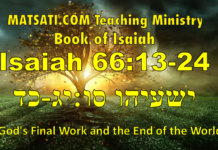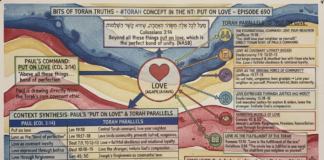Table of Contents
Introduction to Isaiah 10:1-11
One of the major themes that we receive throughout the Scriptures is the importance of listening to the Lord God in heaven. We also note that the commands of God are relevant for all peoples, this is illustrated in Israel’s conquest of the land of Canaan. The commands concerning how Israel was to conduct themselves in war with the surrounding nations appear in two major passages according to Devarim / Deuteronomy 7:1-6, 17-26 and 20:10-18.
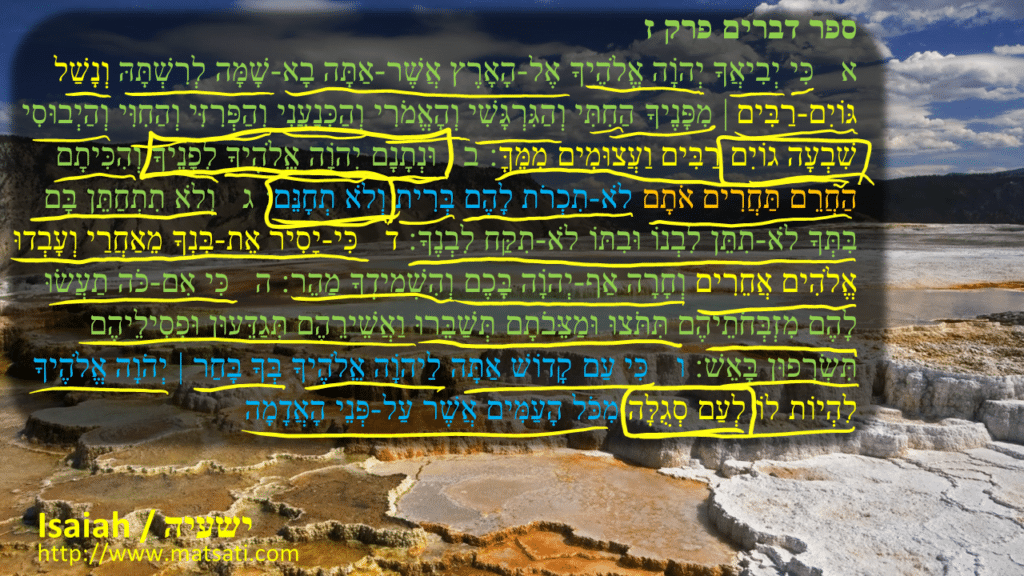
ספר דברים פרק ז
א כִּי יְבִיאֲךָ יְהוָֹה אֱלֹהֶיךָ אֶל-הָאָרֶץ אֲשֶׁר-אַתָּה בָא-שָׁמָּה לְרִשְׁתָּהּ וְנָשַׁל גּוֹיִם-רַבִּים | מִפָּנֶיךָ הַחִתִּי וְהַגִּרְגָּשִׁי וְהָאֱמֹרִי וְהַכְּנַעֲנִי וְהַפְּרִזִּי וְהַחִוִּי וְהַיְבוּסִי שִׁבְעָה גוֹיִם רַבִּים וַעֲצוּמִים מִמֶּךָּ: ב וּנְתָנָם יְהוָֹה אֱלֹהֶיךָ לְפָנֶיךָ וְהִכִּיתָם הַחֲרֵם תַּחֲרִים אֹתָם לֹא-תִכְרֹת לָהֶם בְּרִית וְלֹא תְחָנֵּם: ג וְלֹא תִתְחַתֵּן בָּם בִּתְּךָ לֹא-תִתֵּן לִבְנוֹ וּבִתּוֹ לֹא-תִקַּח לִבְנֶךָ: ד כִּי-יָסִיר אֶת-בִּנְךָ מֵאַחֲרַי וְעָבְדוּ אֱלֹהִים אֲחֵרִים וְחָרָה אַף-יְהוָֹה בָּכֶם וְהִשְׁמִידְךָ מַהֵר: ה כִּי אִם-כֹּה תַעֲשֹוּ לָהֶם מִזְבְּחֹתֵיהֶם תִּתֹּצוּ וּמַצֵּבֹתָם תְּשַׁבֵּרוּ וַאֲשֵׁירֵהֶם תְּגַדֵּעוּן וּפְסִילֵיהֶם תִּשְֹרְפוּן בָּאֵשׁ: ו כִּי עַם קָדוֹשׁ אַתָּה לַיהוָֹה אֱלֹהֶיךָ בְּךָ בָּחַר | יְהֹוָה אֱלֹהֶיךָ לִהְיוֹת לוֹ לְעַם סְגֻלָּה מִכֹּל הָעַמִּים אֲשֶׁר עַל-פְּנֵי הָאֲדָמָה:
Devarim / Deuteronomy 7:1-6
7:1 When the LORD thy God shall bring thee into the land whither thou goest to possess it, and hath cast out many nations before thee, the Hittites, and the Girgashites, and the Amorites, and the Canaanites, and the Perizzites, and the Hivites, and the Jebusites, seven nations greater and mightier than thou; 7:2 And when the LORD thy God shall deliver them before thee; thou shalt smite them, and utterly destroy them; thou shalt make no covenant with them, nor shew mercy unto them: 7:3 Neither shalt thou make marriages with them; thy daughter thou shalt not give unto his son, nor his daughter shalt thou take unto thy son. 7:4 For they will turn away thy son from following me, that they may serve other gods: so will the anger of the LORD be kindled against you, and destroy thee suddenly. 7:5 But thus shall ye deal with them; ye shall destroy their altars, and break down their images, and cut down their groves, and burn their graven images with fire. 7:6 For thou art an holy people unto the LORD thy God: the LORD thy God hath chosen thee to be a special people unto himself, above all people that are upon the face of the earth. (KJV)
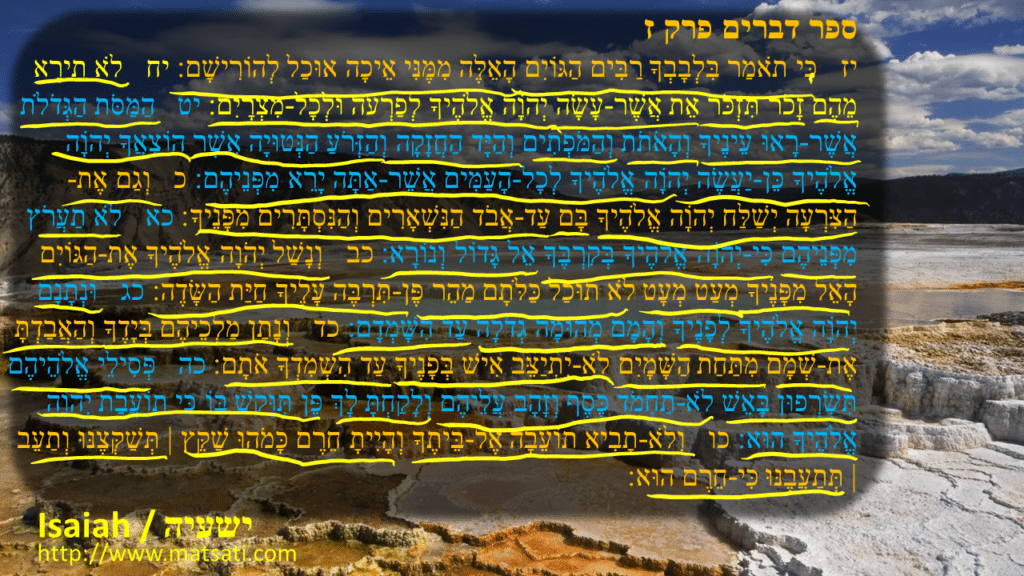
ספר דברים פרק ז
יז כִּי תֹאמַר בִּלְבָבְךָ רַבִּים הַגּוֹיִם הָאֵלֶּה מִמֶּנִּי אֵיכָה אוּכַל לְהוֹרִישָׁם: יח לֹא תִירָא מֵהֶם זָכֹר תִּזְכֹּר אֵת אֲשֶׁר-עָשָֹה יְהוָֹה אֱלֹהֶיךָ לְפַרְעֹה וּלְכָל-מִצְרָיִם: יט הַמַּסֹּת הַגְּדֹלֹת אֲשֶׁר-רָאוּ עֵינֶיךָ וְהָאֹתֹת וְהַמֹּפְתִים וְהַיָּד הַחֲזָקָה וְהַזְּרֹעַ הַנְּטוּיָה אֲשֶׁר הוֹצִאֲךָ יְהוָֹה אֱלֹהֶיךָ כֵּן-יַעֲשֶֹה יְהוָֹה אֱלֹהֶיךָ לְכָל-הָעַמִּים אֲשֶׁר-אַתָּה יָרֵא מִפְּנֵיהֶם: כ וְגַם אֶת-הַצִּרְעָה יְשַׁלַּח יְהוָֹה אֱלֹהֶיךָ בָּם עַד-אֲבֹד הַנִּשְׁאָרִים וְהַנִּסְתָּרִים מִפָּנֶיךָ: כא לֹא תַעֲרֹץ מִפְּנֵיהֶם כִּי-יְהוָֹה אֱלֹהֶיךָ בְּקִרְבֶּךָ אֵל גָּדוֹל וְנוֹרָא: כב וְנָשַׁל יְהֹוָה אֱלֹהֶיךָ אֶת-הַגּוֹיִם הָאֵל מִפָּנֶיךָ מְעַט מְעָט לֹא תוּכַל כַּלֹּתָם מַהֵר פֶּן-תִּרְבֶּה עָלֶיךָ חַיַּת הַשָּׂדֶה: כג וּנְתָנָם יְהוָֹה אֱלֹהֶיךָ לְפָנֶיךָ וְהָמָם מְהוּמָה גְדֹלָה עַד הִשָּׁמְדָם: כד וְנָתַן מַלְכֵיהֶם בְּיָדֶךָ וְהַאֲבַדְתָּ אֶת-שְׁמָם מִתַּחַת הַשָּׁמָיִם לֹא-יִתְיַצֵּב אִישׁ בְּפָנֶיךָ עַד הִשְׁמִדְךָ אֹתָם: כה פְּסִילֵי אֱלֹהֵיהֶם תִּשְֹרְפוּן בָּאֵשׁ לֹא-תַחְמֹד כֶּסֶף וְזָהָב עֲלֵיהֶם וְלָקַחְתָּ לָךְ פֶּן תִּוָּקֵשׁ בּוֹ כִּי תוֹעֲבַת יְהוָֹה אֱלֹהֶיךָ הוּא: כו וְלֹא-תָבִיא תוֹעֵבָה אֶל-בֵּיתֶךָ וְהָיִיתָ חֵרֶם כָּמֹהוּ שַׁקֵּץ | תְּשַׁקְּצֶנּוּ וְתַעֵב | תְּתַעֲבֶנּוּ כִּי-חֵרֶם הוּא:
Devarim / Deuteronomy 7:17-26
7:17 If thou shalt say in thine heart, These nations are more than I; how can I dispossess them? 7:18 Thou shalt not be afraid of them: but shalt well remember what the LORD thy God did unto Pharaoh, and unto all Egypt; 7:19 The great temptations which thine eyes saw, and the signs, and the wonders, and the mighty hand, and the stretched out arm, whereby the LORD thy God brought thee out: so shall the LORD thy God do unto all the people of whom thou art afraid. 7:20 Moreover the LORD thy God will send the hornet among them, until they that are left, and hide themselves from thee, be destroyed. 7:21 Thou shalt not be affrighted at them: for the LORD thy God is among you, a mighty God and terrible. 7:22 And the LORD thy God will put out those nations before thee by little and little: thou mayest not consume them at once, lest the beasts of the field increase upon thee. 7:23 But the LORD thy God shall deliver them unto thee, and shall destroy them with a mighty destruction, until they be destroyed. 7:24 And he shall deliver their kings into thine hand, and thou shalt destroy their name from under heaven: there shall no man be able to stand before thee, until thou have destroyed them. 7:25 The graven images of their gods shall ye burn with fire: thou shalt not desire the silver or gold that is on them, nor take it unto thee, lest thou be snared therin: for it is an abomination to the LORD thy God. 7:26 Neither shalt thou bring an abomination into thine house, lest thou be a cursed thing like it: but thou shalt utterly detest it, and thou shalt utterly abhor it; for it is a cursed thing. (KJV)
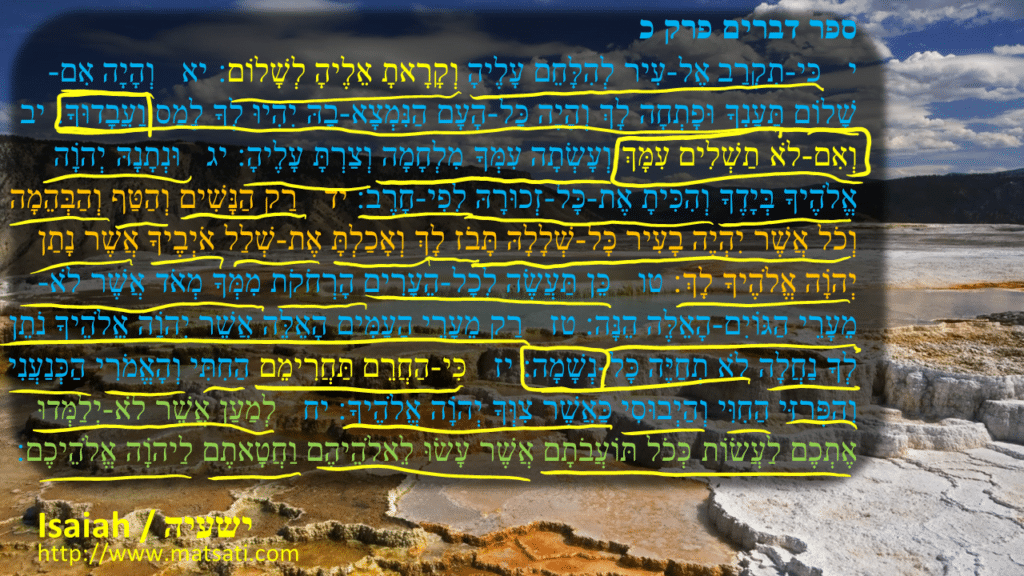
ספר דברים פרק כ
י כִּי-תִקְרַב אֶל-עִיר לְהִלָּחֵם עָלֶיהָ וְקָרָאתָ אֵלֶיהָ לְשָׁלוֹם: יא וְהָיָה אִם-שָׁלוֹם תַּעַנְךָ וּפָתְחָה לָךְ וְהָיָה כָּל-הָעָם הַנִּמְצָא-בָהּ יִהְיוּ לְךָ לָמַס וַעֲבָדוּךָ: יב וְאִם-לֹא תַשְׁלִים עִמָּךְ וְעָשְֹתָה עִמְּךָ מִלְחָמָה וְצַרְתָּ עָלֶיהָ: יג וּנְתָנָהּ יְהוָֹה אֱלֹהֶיךָ בְּיָדֶךָ וְהִכִּיתָ אֶת-כָּל-זְכוּרָהּ לְפִי-חָרֶב: יד רַק הַנָּשִׁים וְהַטַּף וְהַבְּהֵמָה וְכֹל אֲשֶׁר יִהְיֶה בָעִיר כָּל-שְׁלָלָהּ תָּבֹז לָךְ וְאָכַלְתָּ אֶת-שְׁלַל אֹיְבֶיךָ אֲשֶׁר נָתַן יְהוָֹה אֱלֹהֶיךָ לָךְ: טו כֵּן תַּעֲשֶֹה לְכָל-הֶעָרִים הָרְחֹקֹת מִמְּךָ מְאֹד אֲשֶׁר לֹא-מֵעָרֵי הַגּוֹיִם-הָאֵלֶּה הֵנָּה: טז רַק מֵעָרֵי הָעַמִּים הָאֵלֶּה אֲשֶׁר יְהוָֹה אֱלֹהֶיךָ נֹתֵן לְךָ נַחֲלָה לֹא תְחַיֶּה כָּל-נְשָׁמָה: יז כִּי-הַחֲרֵם תַּחֲרִימֵם הַחִתִּי וְהָאֱמֹרִי הַכְּנַעֲנִי וְהַפְּרִזִּי הַחִוִּי וְהַיְבוּסִי כַּאֲשֶׁר צִוְּךָ יְהוָֹה אֱלֹהֶיךָ: יח לְמַעַן אֲשֶׁר לֹא-יְלַמְּדוּ אֶתְכֶם לַעֲשֹוֹת כְּכֹל תּוֹעֲבֹתָם אֲשֶׁר עָשֹוּ לֵאלֹהֵיהֶם וַחֲטָאתֶם לַיהוָֹה אֱלֹהֵיכֶם:
Devarim / Deuteronomy 20:10-18
20:10 When thou comest nigh unto a city to fight against it, then proclaim peace unto it. 20:11 And it shall be, if it make thee answer of peace, and open unto thee, then it shall be, that all the people that is found therein shall be tributaries unto thee, and they shall serve thee. 20:12 And if it will make no peace with thee, but will make war against thee, then thou shalt besiege it: 20:13 And when the LORD thy God hath delivered it into thine hands, thou shalt smite every male thereof with the edge of the sword: 20:14 But the women, and the little ones, and the cattle, and all that is in the city, even all the spoil thereof, shalt thou take unto thyself; and thou shalt eat the spoil of thine enemies, which the LORD thy God hath given thee. 20:15 Thus shalt thou do unto all the cities which are very far off from thee, which are not of the cities of these nations. 20:16 But of the cities of these people, which the LORD thy God doth give thee for an inheritance, thou shalt save alive nothing that breatheth: 20:17 But thou shalt utterly destroy them; namely, the Hittites, and the Amorites, the Canaanites, and the Perizzites, the Hivites, and the Jebusites; as the LORD thy God hath commanded thee: 20:18 That they teach you not to do after all their abominations, which they have done unto their gods; so should ye sin against the LORD your God. (KJV)
These passages make it clear that Israel was to drive out the inhabitants of the land, utterly destroy them, and not intermarry with them, have nothing to do with them and the way they live their lives, etc. The idea written in Devarim / Deuteronomy 7:2, וּנְתָנָם יְהוָֹה אֱלֹהֶיךָ לְפָנֶיךָ וְהִכִּיתָם הַחֲרֵם תַּחֲרִים אֹתָם “And when the LORD thy God shall deliver them before thee; thou shalt smite them, and utterly destroy them” reinforces the command to Israel that she is not to make treaties with these people, they are to show no mercy, etc. In Devarim / Deuteronomy 20:10-18 instructions are given on how to deal with foreign nations, those outside of the land of Canaan. If they are being invaded, and they happen to come upon a foreign city, they were first to offer peace, if they refused peace, they were to kill the males, the women, children, and plunder was theirs to take. We note how this draws a distinction between the people of Canaan as opposed to the people of the nation’s outside of Israel. The people in Canaan were to be utterly destroyed and driven out. These commands are coupled to Israel being instructed to also not worship their gods or live in their sinful ways. We note that their destruction was not a matter of race, religion, or land, it was a matter of judgment, the people being allowed a period of time to repent, to turn from their sin, 430 years was given, and their refusal and unwillingness to relent or repent of their evil ways led to their eventual destruction. This is the point, or these commands, and the illustration that is given to all people in every nation concerning God’s Word, that unrepentant sin leads to death and destruction. We note that in these passages, God’s command to exterminate the people of Canaan did not depend upon whether one converted to Judaism or not. There were 10 nations that were marked (specifically mentioned) designated for destruction (Devarim / Deuteronomy 7:1). This destruction had one reason, it was the judgment of the people for their sins and unwillingness to repent. We note that the reason Israel was commanded to kill the Canaanites was not merely to take control of the land, but to make clear that these peoples were being destroyed for their sins. The land was then given for a blessing. Similarly, if Israel sinned and turned from God’s holy ways, looked to foreign gods, and was unwilling to repent and turn from their sins, they too would lose the land and be destroyed just as the people of Canaan are being destroyed. This is exactly what we are seeing taking place in the book of Isaiah. God brings foreign nations to exact punishment due to unrepentance. Note that these truths are as valid for us today as they were back in those days if we are unwilling to repent and call upon the Lord God our Father in heaven in the name of Yeshua the Messiah! One of the major reasons people do not generally repent is due to pride, not wanting to humble oneself before God and men, and see forgiveness. We note that the Torah command was that each man would treat the other with respect, love, and justice, showing equal treatment towards one another regardless of who he or she is; these things naturally are drawn out due to the character of God. (Shemot / Exodus 23:6-9, Vayikra / Leviticus 19:15, Devarim / Deuteronomy 10:17, 16:19, and 24:17). We also note that the commands were not being given for the purpose of one earning their salvation. The Idea that under the Mosaic Covenant one needed to earn his salvation by keeping the commands is utterly false! The Torah as well as all of Scriptures never say that one must do something in order to be saved besides having faith! Salvation throughout scripture from the beginning to the end has always been by faith! Now, after having entered into a covenant relationship with the Lord God of Israel, there are certain expectations for the life of the one who has been saved. The Torah lays out what is expected of us, and how we can bring glory to God in heaven. With the coming of Yeshua, we have the power of God’s indwelling spirit, a Torah centric principle (God dwelling in our midst), to overcome sin. The natural outcome of walking in the Spirit is walking according to God’s commands! This has always been true. What is false is to perpetuate the teaching that one had to obey the commands to be saved. This wasn’t the original intent of the Torah, but what we are learning, based upon the 430 years of repentance given to Canaan, is that there is only One Torah for all (Shemot Exodus 12:49), the Scriptures are explicitly clear about this. This is very logical as we are all part of one family of God for those who believe! The proper context of the commands, even the moedim, is found in the fruit of the Holy spirit that dwells within! This demonstrates that we are to have a relationship with God, and this is why it becomes very clear what happens to the one who rejects these things that are found in the Scriptures. Such a person does not have a relationship with God in heaven and begins to oppress the people through unrighteous decrees and judgments, the very thing we see taking place today all around the world in the so-called pandemic! Isaiah picks up here saying the following according to Isaiah 10:1.
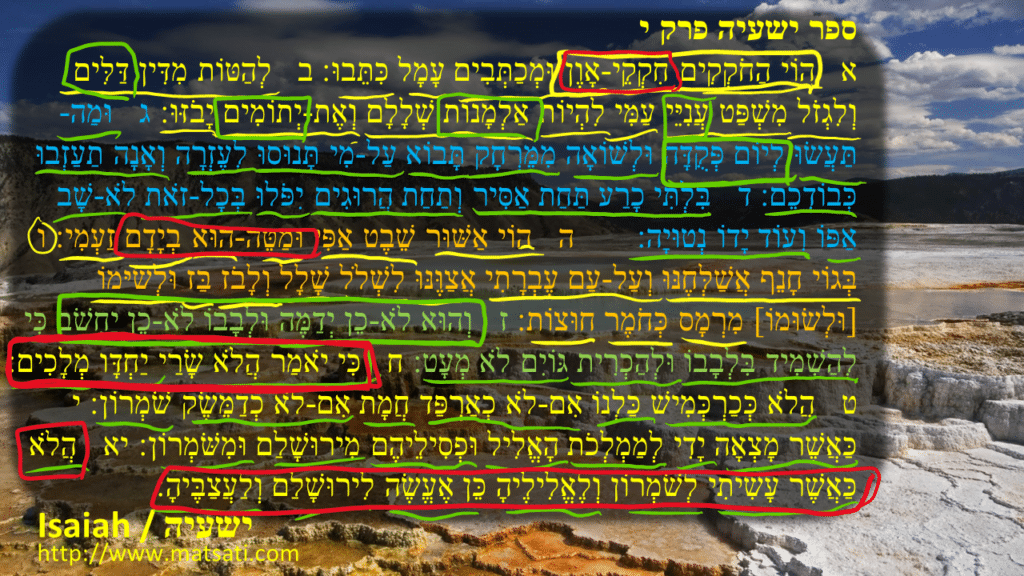
ספר ישעיה פרק י
א הוֹי הַחֹקְקִים חִקְקֵי-אָוֶן וּמְכַתְּבִים עָמָל כִּתֵּבוּ: ב לְהַטּוֹת מִדִּין דַּלִּים וְלִגְזֹל מִשְׁפַּט עֲנִיֵּי עַמִּי לִהְיוֹת אַלְמָנוֹת שְׁלָלָם וְאֶת-יְתוֹמִים יָבֹזּוּ:
Isaiah 10:1 states, “Woe unto them that decree unrighteous decrees (הוֹי הַחֹקְקִים חִקְקֵי-אָוֶן), and that write grievousness which they have prescribed; (וּמְכַתְּבִים עָמָל כִּתֵּבוּ)” Isaiah 10:2 “To turn aside the needy from judgment, (לְהַטּוֹת מִדִּין דַּלִּים) and to take away the right from the poor of my people, (וְלִגְזֹל מִשְׁפַּט עֲנִיֵּי עַמִּי לִהְיוֹת) that widows may be their prey, (אַלְמָנוֹת שְׁלָלָם) and that they may rob the fatherless! (וְאֶת-יְתוֹמִים יָבֹזּוּ)” We note something that is taking place here that is taking place today, those who make the laws הוֹי הַחֹקְקִים חִקְקֵי-אָוֶן “Woe unto them that decree unrighteous decrees” they are doing so they can become wealthy at the expense of others. This might be the interpretation of Isaiah’s use of the needy (דַּלִּים), the poor (עֲנִיֵּי), the widow (אַלְמָנוֹת), and the fatherless (יְתוֹמִים). We note that these decrees turn judgment aside, take away the rights of people, set up widows to be prey (שְׁלָלָם) and rob from those who have no parents. These are unjust actions that are perpetuated through the writing of legal decrees in the courts of law or maybe even by case law and corrupt rulings these things are being written in place? The point is the Lord God cares! The way the law makers corrupt their ways and write into law their corruption making it the way of the land, is an affront to God who is the champion of justice and truth! Because of these things, a kingdom will not last, it will not stand, eventually such a kingdom will fall, and the people will be set free from these corrupt leaders!
ספר ישעיה פרק י
ג וּמַה-תַּעֲשֹוּ לְיוֹם פְּקֻדָּה וּלְשׁוֹאָה מִמֶּרְחָק תָּבוֹא עַל-מִי תָּנוּסוּ לְעֶזְרָה וְאָנָה תַעַזְבוּ כְּבוֹדְכֶם: ד בִּלְתִּי כָרַע תַּחַת אַסִּיר וְתַחַת הֲרוּגִים יִפֹּלוּ בְּכָל-זֹאת לֹא-שָׁב אַפּוֹ וְעוֹד יָדוֹ נְטוּיָה:
Isaiah 10:3 states, “And what will ye do in the day of visitation, (וּמַה-תַּעֲשֹוּ לְיוֹם פְּקֻדָּה) and in the desolation which shall come from far? (וּלְשׁוֹאָה מִמֶּרְחָק תָּבוֹא) to whom will ye flee for help? (עַל-מִי תָּנוּסוּ לְעֶזְרָה) and where will ye leave your glory? (וְאָנָה תַעַזְבוּ כְּבוֹדְכֶם)” Isaiah 10:4 “Without me they shall bow down under the prisoners, (בִּלְתִּי כָרַע תַּחַת אַסִּיר) and they shall fall under the slain. (תַחַת הֲרוּגִים יִפֹּלוּ) For all this his anger is not turned away, (בְּכָל-זֹאת לֹא-שָׁב אַפּוֹ) but his hand is stretched out still. (וְעוֹד יָדוֹ נְטוּיָה)” This לְיוֹם פְּקֻדָּה “day of visitation” is a day of reckoning due to one’s sins. Note that the war with foreign nations comes due to the people turning from God and from His ways to live as they choose, to create laws that are corrupt to harm the innocent, and to make this the way of all the people in the land essentially corrupting the people, giving them permission to be unjust to one another. We note that Isaiah asks, עַל-מִי תָּנוּסוּ לְעֶזְרָה “to whom will ye flee for help?” This reminds us of the NT text, something that Yeshua asked the disciples, and their response was “to whom shall we go?” According to John 6, Yeshua spoke of a very difficult teaching, speaking about people needing to eat his flesh and drink his blood. These things were said in parallel to how we read Mishley / Proverbs 1 being written concerning wisdom. One is to take upon his or herself Yeshua’s teachings of truth and life and walk in them. Catholics believe this is literally a transubstantiation where the elements of the sacrament literally turn into the body and blood of Yeshua. This however was not the case, as Yeshua was looking at this from a Jewish perspective and doing so the best parallel may be found according to the words of Solomon. Following Yeshua’s statements many of his disciples decided to leave. This is where the story picks up in John 6:60.
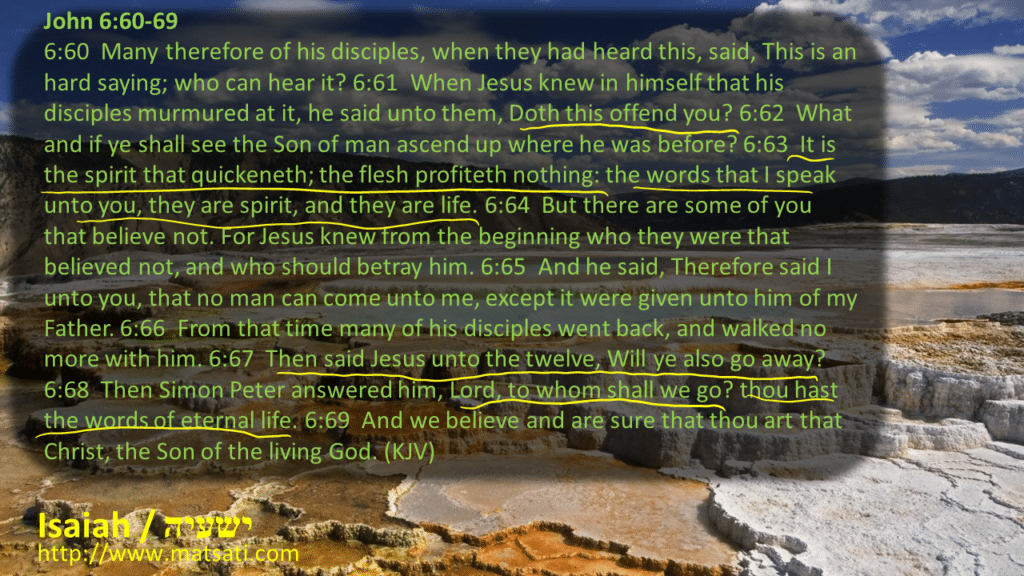
John 6:60-69
6:60 Many therefore of his disciples, when they had heard this, said, This is an hard saying; who can hear it? 6:61 When Jesus knew in himself that his disciples murmured at it, he said unto them, Doth this offend you? 6:62 What and if ye shall see the Son of man ascend up where he was before? 6:63 It is the spirit that quickeneth; the flesh profiteth nothing: the words that I speak unto you, they are spirit, and they are life. 6:64 But there are some of you that believe not. For Jesus knew from the beginning who they were that believed not, and who should betray him. 6:65 And he said, Therefore said I unto you, that no man can come unto me, except it were given unto him of my Father. 6:66 From that time many of his disciples went back, and walked no more with him. 6:67 Then said Jesus unto the twelve, Will ye also go away? 6:68 Then Simon Peter answered him, Lord, to whom shall we go? thou hast the words of eternal life. 6:69 And we believe and are sure that thou art that Christ, the Son of the living God. (KJV)
Peter said, “Lord, to whom shall we go?” a direct parallel to what Isaiah is stating here. Peter says “you have the words of eternal life!” The people in Isaiah’s time were poor stewards of what God had given them. We all wait for this לְיוֹם פְּקֻדָּה “day of visitation,” which is different for the righteous as compared for the wicked. Those of us long for and desire for the return of the Lord. This becomes a desirable thing for those who are under the hand of God, who seek to live for His glory. The day of visitation is a disaster for those who are corrupt. Yeshua provides an example of this according to Matthew 25:45-51.
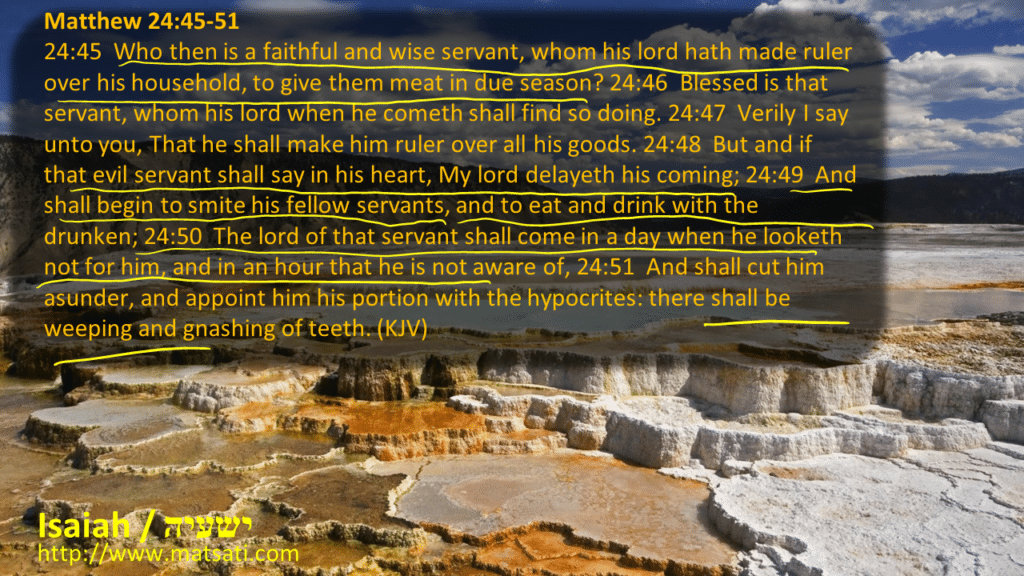
Matthew 24:45-51
24:45 Who then is a faithful and wise servant, whom his lord hath made ruler over his household, to give them meat in due season? 24:46 Blessed is that servant, whom his lord when he cometh shall find so doing. 24:47 Verily I say unto you, That he shall make him ruler over all his goods. 24:48 But and if that evil servant shall say in his heart, My lord delayeth his coming; 24:49 And shall begin to smite his fellow servants, and to eat and drink with the drunken; 24:50 The lord of that servant shall come in a day when he looketh not for him, and in an hour that he is not aware of, 24:51 And shall cut him asunder, and appoint him his portion with the hypocrites: there shall be weeping and gnashing of teeth. (KJV)
Note how these people are treating their own people. Their position of power is giving them an opportunity to walk in the backs of the poor and helpless as Yeshua says, to beat their fellow servants, to eat and drink and be drunken, and those who do this the Lord will come in an hour they are unaware of and they will be cut down and cast into hell. Because these wicked people have turned from the Lord, their help is removed from them, and so Isaiah says in Isaiah 10:4 בִּלְתִּי כָרַע תַּחַת אַסִּיר “Without me they shall bow down under the prisoners,” תַחַת הֲרוּגִים יִפֹּלוּ “and they shall fall under the slain,” בְּכָל-זֹאת לֹא-שָׁב אַפּוֹ “For all this his anger is not turned away,” וְעוֹד יָדוֹ נְטוּיָה “but his hand is stretched out still.” The enemy will come and have his way with the people, and they will be unable to overcome. It is because of the people’s failure to listen to the Lord and failure to seek Him that they are destroyed. These things reveal that the Lord God of Israel is with us for either good or bad, the purpose all of which is for our turning to Him and seeking His moving in our lives. We will either choose to live for Him being specific to the point of bearing His testimonies or live for ourselves and descend into destruction. We note that it is not these foreign countries that hold the power to do these things. It is the Lord God Almighty in heaven who decides and allows things to happen for our benefit, whether good or bad. This again is why Paul wrote according to Romans 8:28, And we know that all things work together for good to them that love God, to them who are the called according to his purpose. (KJV)
ספר ישעיה פרק י
ה הוֹי אַשּׁוּר שֵׁבֶט אַפִּי וּמַטֶּה-הוּא בְיָדָם זַעְמִי: ו בְּגוֹי חָנֵף אֲשַׁלְּחֶנּוּ וְעַל-עַם עֶבְרָתִי אֲצַוֶּנּוּ לִשְׁלֹל שָׁלָל וְלָבֹז בַּז וּלְשֹיּמוֹ [וּלְשֹוּמוֹ] מִרְמָס כְּחֹמֶר חוּצוֹת:
Isaiah 10:5 states, “O Assyrian, (הוֹי אַשּׁוּר) the rod of mine anger, (שֵׁבֶט אַפִּי) and the staff in their hand is mine indignation. (וּמַטֶּה-הוּא בְיָדָם זַעְמִי)” Isaiah 10:6 “I will send him against an hypocritical nation, (בְּגוֹי חָנֵף אֲשַׁלְּחֶנּוּ) and against the people of my wrath will I give him a charge, (וְעַל-עַם עֶבְרָתִי אֲצַוֶּנּוּ) to take the spoil, and to take the prey, (לִשְׁלֹל שָׁלָל וְלָבֹז בַּז) and to tread them down like the mire of the streets. (וּלְשֹיּמוֹ [וּלְשֹוּמוֹ] מִרְמָס כְּחֹמֶר חוּצוֹת)” We note the way this is written, וּמַטֶּה-הוּא בְיָדָם Assyria, the staff in their hand, this is an act of God, empowering the foreign nation to move against Judah and Jerusalem. What we note from these verses is that the Lord God of Israel is always with His people, the difference is in what way, either for us or against us. These things reveal how he is sovereign, almighty, and all things are in His hands. The people ignored His Words, His presence, and His calling, even today people ignore the Lord to their own peril. This is the concept of a nation or even an individual bringing destruction upon themselves. These events speak to how the Lord God Almighty guides these peoples and nations according to His plans, all are under His hand. This is why Isaiah says, בְּגוֹי חָנֵף אֲשַׁלְּחֶנּוּ “I will send him against an hypocritical nation,” and וְעַל-עַם עֶבְרָתִי אֲצַוֶּנּוּ “against the people of my wrath will I give him a charge.” The hypocritical nation is like one who pretends to have certain beliefs but behaves in a way that disagrees with those beliefs. To a limited extent, we all are a little hypocritical the moment we sin. Hypocrisy is quite complex in that it has to do with our heart, our mind, our attitudes, our relationship with God, and our relationship with people. We note what Yeshua says according to Luke 6:39-42.
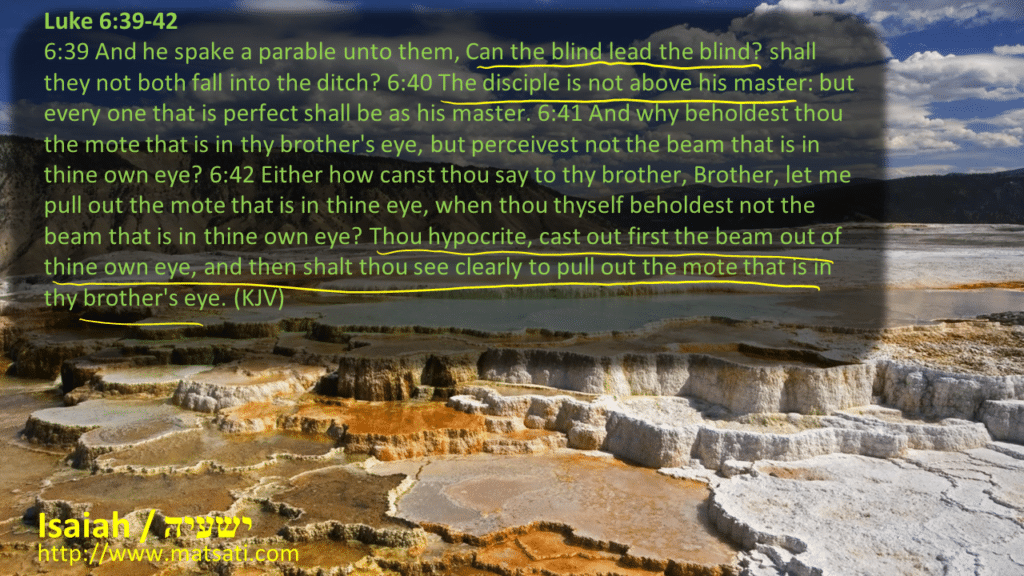
Luke 6:39-42
6:39 And he spake a parable unto them, Can the blind lead the blind? shall they not both fall into the ditch? 6:40 The disciple is not above his master: but every one that is perfect shall be as his master. 6:41 And why beholdest thou the mote that is in thy brother’s eye, but perceivest not the beam that is in thine own eye? 6:42 Either how canst thou say to thy brother, Brother, let me pull out the mote that is in thine eye, when thou thyself beholdest not the beam that is in thine own eye? Thou hypocrite, cast out first the beam out of thine own eye, and then shalt thou see clearly to pull out the mote that is in thy brother’s eye. (KJV)
Here is the type of person, the hypocrite, the one who judges while doing the same sinful acts. The sin becomes a speck, a stumbling block, something that needs to be dealt with. The idea is that one must deal with himself first, dealing with both the sin and the hypocrisy. To begin, we have to stop comparing ourselves with other people, the reason being we are all different. What we are to measure our lives up to is not other people, but the word of God. This was the purpose of God giving us His Torah. It is only with God’s help that we can live a consistent and authentic life. The Life that is lived for the Lord brings stability. Stability comes by studying God’s word and walking according to the Spirit by putting God’s word into practice. Because the people refused to humble themselves, God is using Assyria to punish them. The phrase וּמַטֶּה-הוּא בְיָדָם, the staff in their hand is a reference to a nation that rejects the God of Israel, yet the Lord uses that nation to do His will. Isaiah correctly understood how all people may be used of God in one way or another, and the ultimate consequences of sin. These things reveal that there is a level of accountability we are all responsible for, if not in this world (olah hazeh) then in the world to come (olam haba). We note what Yeshua said according to Luke 12:48, “But he that knew not, and did commit things worthy of stripes, shall be beaten with few stripes. For unto whomsoever much is given, of him shall be much required: and to whom men have committed much, of him they will ask the more.” (KJV) These things reveal to us that man’s knowledge can also be a measure of his responsibilities, which relates to whether one has few lashings or many lashes in a court of law. We also note that ignorance does not forbear innocence per what we read according to the Torah in Vayikra / Leviticus 5:17.
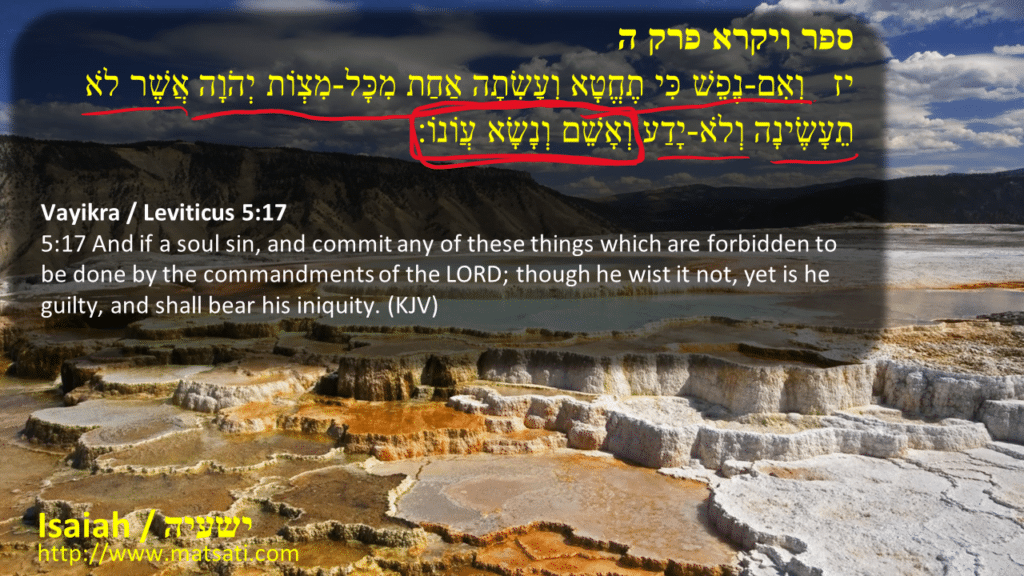
ספר ויקרא פרק ה
יז וְאִם-נֶפֶשׁ כִּי תֶחֱטָא וְעָשְֹתָה אַחַת מִכָּל-מִצְוֹת יְהֹוָה אֲשֶׁר לֹא תֵעָשֶֹינָה וְלֹא-יָדַע וְאָשֵׁם וְנָשָֹא עֲוֹנוֹ:
Vayikra / Leviticus 5:17
5:17 And if a soul sin, and commit any of these things which are forbidden to be done by the commandments of the LORD; though he wist it not, yet is he guilty, and shall bear his iniquity. (KJV)
The absence of knowledge does not make one not guilty. Yeshua describes these things as both being guilty, just requiring greater or lesser beating. These things relate to all peoples and all cultures, races, and nations on this Earth!
ספר ישעיה פרק י
ז וְהוּא לֹא-כֵן יְדַמֶּה וּלְבָבוֹ לֹא-כֵן יַחְשֹׁב כִּי לְהַשְׁמִיד בִּלְבָבוֹ וּלְהַכְרִית גּוֹיִם לֹא מְעָט:
Isaiah 10:7 states, “Howbeit he meaneth not so, neither doth his heart think so; (וְהוּא לֹא-כֵן יְדַמֶּה וּלְבָבוֹ לֹא-כֵן יַחְשֹׁב) but it is in his heart to destroy and cut off nations not a few. (כִּי לְהַשְׁמִיד בִּלְבָבוֹ וּלְהַכְרִית גּוֹיִם לֹא מְעָט)” This statement וְהוּא לֹא-כֵן יְדַמֶּה וּלְבָבוֹ לֹא-כֵן יַחְשֹׁב “But this is not what he intends, this is not what he has in mind” suggests that one does not know if what he is doing inspired by God. We note that here Assyria did not know that she was doing the Lord’s bidding in destroying Israel. It is in pride that the leaders of Assyria attribute what they do to their own glory, whereas this is to God’s glory. This is the root of human pride, that which sets itself up against the purpose of God. Paul writes of the glory of God in His creation, which is supposed to teach us to be humble.
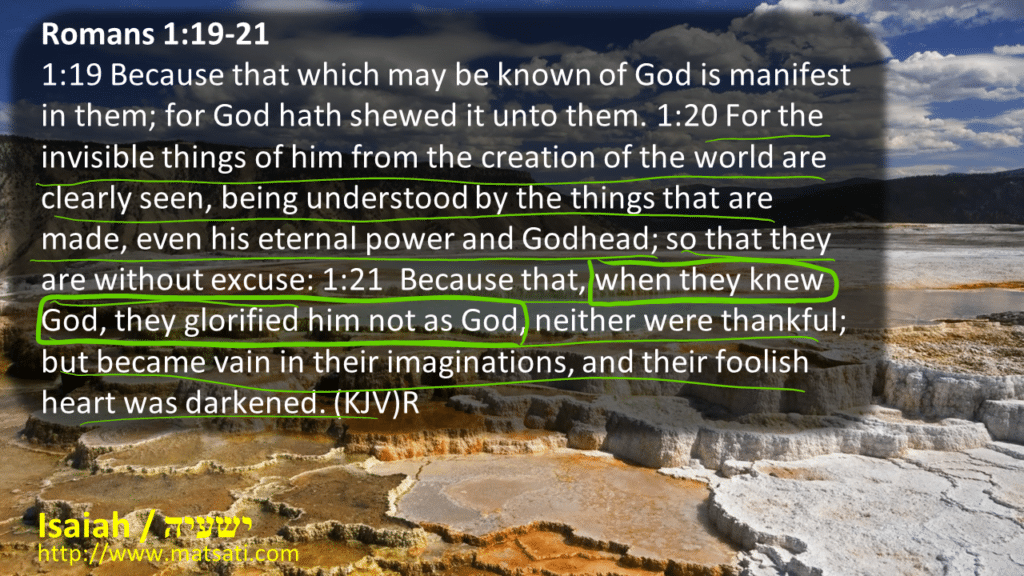
Romans 1:19-21
1:19 Because that which may be known of God is manifest in them; for God hath shewed it unto them. 1:20 For the invisible things of him from the creation of the world are clearly seen, being understood by the things that are made, even his eternal power and Godhead; so that they are without excuse: 1:21 Because that, when they knew God, they glorified him not as God, neither were thankful; but became vain in their imaginations, and their foolish heart was darkened. (KJV)
We note the idea here Paul is speaking of is in relation to having knowledge of something making one more responsible before God illustrated in “when they knew God, they glorified him not as God.” Because of their pride, and lack of humility and thankfulness, their hearts were darkened. This suggests a loss of understanding due to the unwillingness to trust in God and to give Him the glory. We see this very thing happening today, people’s understanding being darkened, confusion, not being able to make the right choices, due to their failure to trust in the Lord God Almighty!
ספר ישעיה פרק י
ח כִּי יֹאמַר הֲלֹא שָֹרַי יַחְדָּו מְלָכִים: ט הֲלֹא כְּכַרְכְּמִישׁ כַּלְנוֹ אִם-לֹא כְאַרְפַּד חֲמָת אִם-לֹא כְדַמֶּשֶֹק שֹׁמְרוֹן: י כַּאֲשֶׁר מָצְאָה יָדִי לְמַמְלְכֹת הָאֱלִיל וּפְסִילֵיהֶם מִירוּשָׁלַם וּמִשֹּׁמְרוֹן: יא הֲלֹא כַּאֲשֶׁר עָשִֹיתִי לְשֹׁמְרוֹן וְלֶאֱלִילֶיהָ כֵּן אֶעֱשֶֹה לִירוּשָׁלַם וְלַעֲצַבֶּיהָ:
Isaiah 10:8 states, “For he saith, Are not my princes altogether kings? (כִּי יֹאמַר הֲלֹא שָֹרַי יַחְדָּו מְלָכִים)” Isaiah 10:9 “Is not Calno as Carchemish? (הֲלֹא כְּכַרְכְּמִישׁ כַּלְנוֹ) is not Hamath as Arpad? (אִם-לֹא כְאַרְפַּד חֲמָת) is not Samaria as Damascus? (אִם-לֹא כְדַמֶּשֶֹק שֹׁמְרוֹן)” Isaiah 10:10 “As my hand hath found the kingdoms of the idols, (כַּאֲשֶׁר מָצְאָה יָדִי לְמַמְלְכֹת הָאֱלִיל) and whose graven images did excel them of Jerusalem and of Samaria; (וּפְסִילֵיהֶם מִירוּשָׁלַם וּמִשֹּׁמְרוֹן)” Isaiah 10:11 “Shall I not, as I have done unto Samaria and her idols, (הֲלֹא כַּאֲשֶׁר עָשִֹיתִי לְשֹׁמְרוֹן וְלֶאֱלִילֶיהָ) so do to Jerusalem and her idols? (כֵּן אֶעֱשֶֹה לִירוּשָׁלַם וְלַעֲצַבֶּיהָ)” This statement here according to Isaiah 10:8, speaks of a Torah based concept: כִּי יֹאמַר הֲלֹא שָֹרַי יַחְדָּו מְלָכִים “For he saith, Are not my princes altogether kings?”
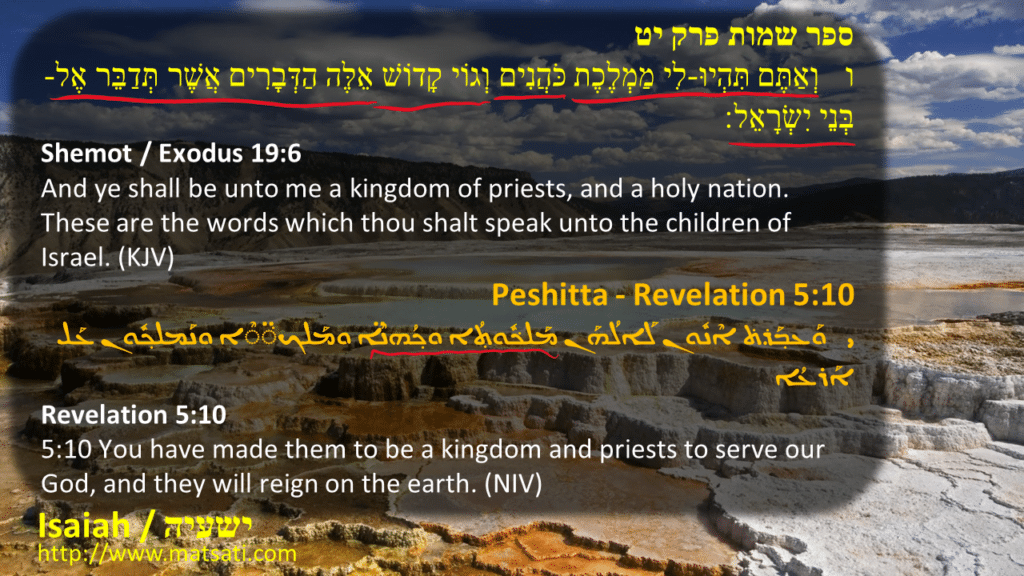
ספר שמות פרק יט
ו וְאַתֶּם תִּהְיוּ-לִי מַמְלֶכֶת כֹּהֲנִים וְגוֹי קָדוֹשׁ אֵלֶּה הַדְּבָרִים אֲשֶׁר תְּדַבֵּר אֶל-בְּנֵי יִשְֹרָאֵל:
Shemot / Exodus 19:6
And ye shall be unto me a kingdom of priests, and a holy nation. These are the words which thou shalt speak unto the children of Israel. (KJV)
Peshitta – Revelation 5:10
ܝ ܘܰܥܒ݂ܰܕ݁ܬ݁ ܐܶܢܽܘܢ ܠܰܐܠܳܗܰܢ ܡܰܠܟ݁ܽܘܬ݂ܳܐ ܘܟ݂ܳܗ̈ܢܶܐ ܘܡܰܠܟ̈݁ܶܐ ܘܢܰܡܠܟ݂ܽܘܢ ܥܰܠ ܐܰܪܥܳܐ
Revelation 5:10
5:10 You have made them to be a kingdom and priests to serve our God, and they will reign on the earth. (NIV)
We note that God makes us to be kings to reign and priests to serve Him. The parallel is to this king of Assyria and his captains who lead the nation into war. These men have been given authority to rule over the people and they do so corruptly through war and destruction. It appears that it is the Lord God in heaven who had given them this position of power as they are serving Him to do His will to Israel, Judah, and Jerusalem. Isaiah states, הֲלֹא כַּאֲשֶׁר עָשִֹיתִי לְשֹׁמְרוֹן וְלֶאֱלִילֶיהָ כֵּן אֶעֱשֶֹה לִירוּשָׁלַם וְלַעֲצַבֶּיהָ “Shall I not, as I have done unto Samaria and her idols, so do to Jerusalem and her idols?” reveals to us that all of these things are happening due to the people’s failure to seek and trust the Lord. Their idolatry has led to their destruction. The same can also be said in this present day, trusting in the idolatry of money, of person, and of man, will lead to destruction with devastating consequences! But it is a truth foundational to all of life here on earth, especially for those who are created after the image of God!
Rabbinic Literature on Isaiah 10:1-11
The Targum Jonathan is a Rabbinic interpretation of the book of Isaiah.
תרגום יונתן בן עוזיאל אל ישעיה פרק י:א-יא
א יֵי דְרָשְמִין רִשֻמִין דְמֵינַס וּכתָב דְלֵיאוּ כָתְבִין׃ ב לְאַסטָאָה מִדִין מִסכֵינִין וּלמֵינַס מָא דְיִרעַן מֵחַשִיכֵי עַמִי בְדִינָא לְמִהוֵי דְאַרמְלָן עְדָיְהֹון וְיָת נִכסֵי עַמְמַיָא יִבְזוּן׃ ג וּמָא תַעבְדוּן לְיֹומָא דְיַסעְרוּן עְלֵיכֹון חֹובֵיכֹון וּלרִיגוּש עָקָא דְמֵירַחִיק יֵיתֵי לְאָן תִערְקוּן לִסעֵיד וְאֵיכָא תִשבְקוּן יְקָרְכֹון׃ ד בְכֵין בַר מִן אְרַעכֹון אְסִירִין תִתאַסרוּן וּבָר מִקִרוֵיכֹון קְטִילִין תִתרְמֹון בִכָל דָא לָא תָבוּ מֵחֹובֵיהֹון דִיתוּב רוּגזֵיה מִינְהֹון וְעַד כְעַן מְתַקְפִין מִרדֵיהֹון וְעֹוד מַחְתֵיה עְתִידָא לְאִתפְרָעָא מִנְהֹון׃ ה יֵי אַתוּרָאָה שֻלטַן רוּגזִי וּמַלאַך שְלִיַח מִן קֳדָמַי עְלֵיהֹון בִלווָט׃ ו בְכִינשָא חַנפָא אְשַלְחִינֵיה וְעַל עַמָא דַעְבַרוּ עַל אֹורָיתִי אְפַקְדִינֵיה לְמִיבַז בִיזָא וּלמִעדֵי עְדָאָה וּלשַוָיוּתֵיה לִדיָש כִסיָן שוּקִין׃ ז וְהוּא לָא כֵין מְדַמֵי וּבלִבֵיה לָא כֵין מְחַשֵיב אְרֵי לְשֵיצָאָה אְמַר בְלִיבֵיה וּלאָסָפָא עַמְמִין לָא בַחְיָס׃ ח אְרֵי יֵימַר הְלָא כָל שִלטֹונַי כַחדָא כְמַלכִין חְשִיבִין קֳדָמָי׃ ט הְלָא כְמָא דְכַרכְמִיש כְבִישָא קֳדָמַי כֵין כַלנֹו אִם לָא כְמָא דְאַרפַד מְסִירָא בִידִי כֵין חְמָת כְמָא דַעְבַדִית לְדַמַשַק כֵין אַעְבֵיד לְשֹמְרֹון׃ י כְמָא דְאַשכַחַת יְדִי מַלכְווָן דִי פָלְחָא לְטָעְוָתָא וּצַלמָנֵיהֹון מָא שְנֹו מִירוּשלַם וּמִשֹמְרֹון׃ יא הְלָא כְמָא דַעְבַדִית לְשֹמְרֹון וּלטָעְוָתַהָא כֵין אַעְבֵיד לִירוּשלַם וּלצַלמָנַיָא דְבַה׃
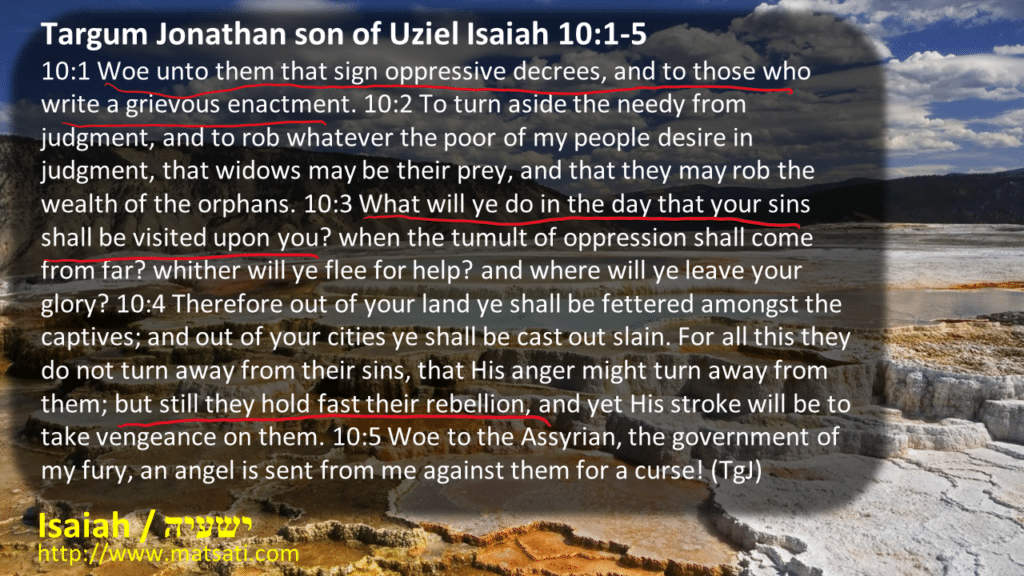
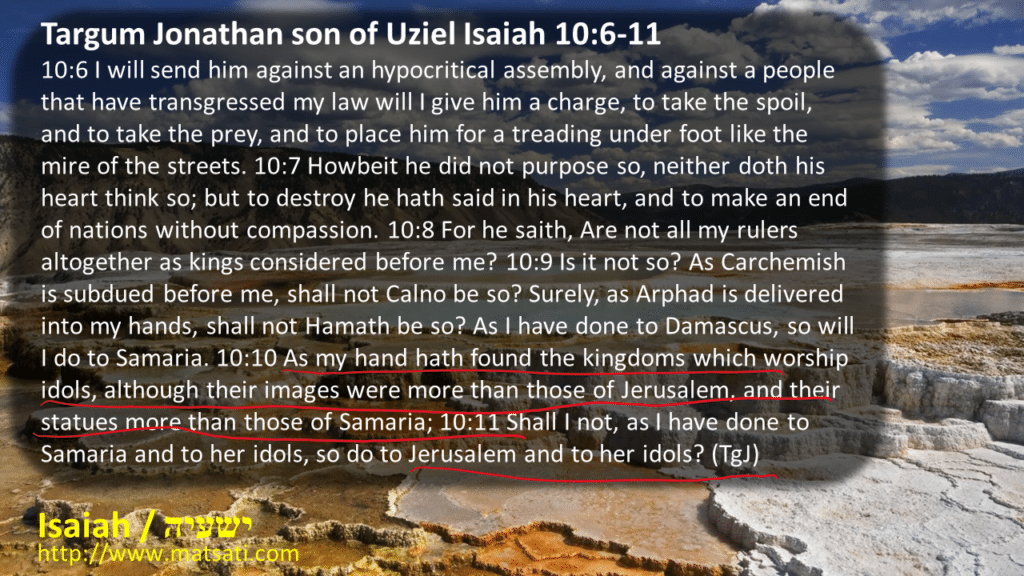
Targum Jonathan son of Uziel Isaiah 10:1-11
10:1 Woe unto them that sign oppressive decrees, and to those who write a grievous enactment. 10:2 To turn aside the needy from judgment, and to rob whatever the poor of my people desire in judgment, that widows may be their prey, and that they may rob the wealth of the orphans. 10:3 What will ye do in the day that your sins shall be visited upon you? when the tumult of oppression shall come from far? whither will ye flee for help? and where will ye leave your glory? 10:4 Therefore out of your land ye shall be fettered amongst the captives; and out of your cities ye shall be cast out slain. For all this they do not turn away from their sins, that His anger might turn away from them; but still they hold fast their rebellion, and yet His stroke will be to take vengeance on them. 10:5 Woe to the Assyrian, the government of my fury, an angel is sent from me against them for a curse! 10:6 I will send him against an hypocritical assembly, and against a people that have transgressed my law will I give him a charge, to take the spoil, and to take the prey, and to place him for a treading under foot like the mire of the streets. 10:7 Howbeit he did not purpose so, neither doth his heart think so; but to destroy he hath said in his heart, and to make an end of nations without compassion. 10:8 For he saith, Are not all my rulers altogether as kings considered before me? 10:9 Is it not so? As Carchemish is subdued before me, shall not Calno be so? Surely, as Arphad is delivered into my hands, shall not Hamath be so? As I have done to Damascus, so will I do to Samaria. 10:10 As my hand hath found the kingdoms which worship idols, although their images were more than those of Jerusalem, and their statues more than those of Samaria; 10:11 Shall I not, as I have done to Samaria and to her idols, so do to Jerusalem and to her idols? (TgJ)
The Talmud is surprisingly silent on these first 11 verses from Isaiah 10. The corruption of the leaders are illustrated in those who make the laws doing so to not just make money, but to do so by robbery and by the prevention of justice to those who are not able to achieve justice on their own (the poor, widows, and orphans). The question that is often asked is “Why and how does power corrupt leaders?” The answer is complex, but based upon the Isaiah text, leadership, at its core, is all about power and influence. There are two approaches to leadership, one is for the benefit of others, and the second is personalized power. A person who uses his position of leadership to help others is taking a higher position than those who do so for their own personal gain. The Messianic approach as leader is to lead the people in God’s Torah, which essentially means to help the people to recognize their sins, repent, and turn to God’s holy and righteous ways. Those who are in power today, just like those in power in the days of Isaiah, use their power for personal gain. This is mutually exclusive from a life of righteousness and holiness. Note how most politicians enter office poor and come out wealthy, having millions of dollars. This is why Isaiah writes, א יֵי דְרָשְמִין רִשֻמִין דְמֵינַס וּכתָב דְלֵיאוּ כָתְבִין: 10:1 Woe unto them that sign oppressive decrees, and to those who write a grievous enactment. (TgJ) The Scriptures say that God has a purpose for everything, even the installation of bad leaders. This might be hard for some to believe, but the truth remains the same, the Lord may also use these leaders to refine us. Note what Solomon wrote according to Mishley / Proverbs 16:4 “The Lord has made everything for its purpose, even the wicked for the day of trouble.” Rashi notes the following concerning this verse.
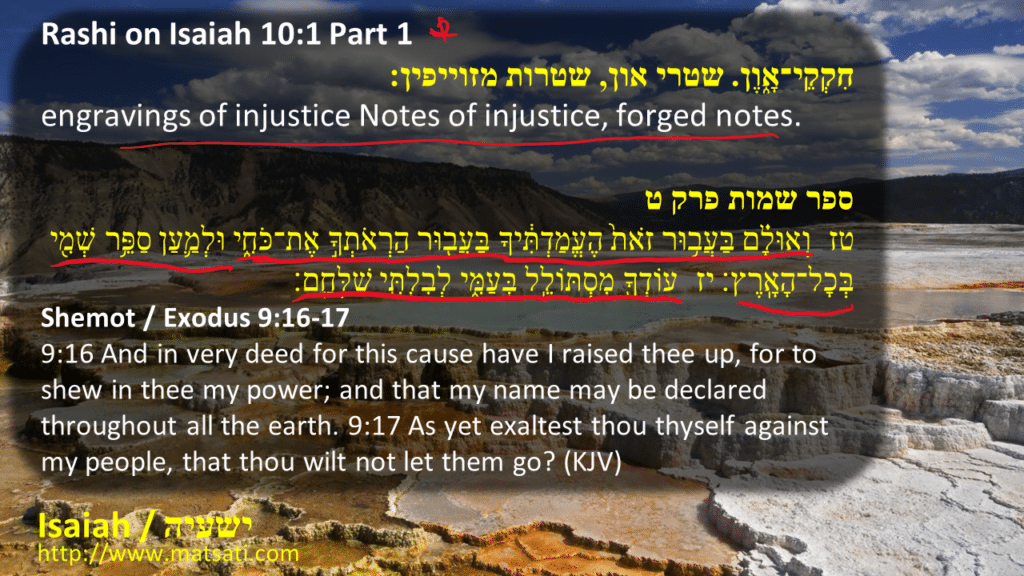
Rashi on Isaiah 10:1 Part 1
חִקְקֵי־אָ֑וֶן. שטרי און, שטרות מזוייפין:
engravings of injustice Notes of injustice, forged notes.
Isaiah writes on the words חִקְקֵי־אָ֑וֶן where the word חִקְקֵי is from the root word חוק meaning “law or statute” of אָ֑וֶן iniquity. Literally the leaders are writing sinful laws, which are interpreted to mean “engravings of injustice, notes of injustice.” According to Daniel 2:21 the Lord God tells us that He “changes the times and the seasons; He removes kings and raises up kings.” ( וְ֠הוּא מְהַשְׁנֵ֤א עִדָּנַיָּא֙ וְזִמְנַיָּ֔א מְהַעְדֵּ֥ה מַלְכִ֖ין וּמְהָקֵ֣ים מַלְכִ֑ין יָהֵ֤ב חָכְמְתָא֙ לְחַכִּימִ֔ין וּמַנְדְּעָ֖א לְיָדְעֵ֥י בִינָֽה׃) This suggests to us that the Lord God puts kings in place for a purpose. Take for example what the Lord said to Pharaoh.
ספר שמות פרק ט
טז וְאוּלָ֗ם בַּעֲב֥וּר זֹאת֙ הֶעֱמַדְתִּ֔יךָ בַּעֲב֖וּר הַרְאֹתְךָ֣ אֶת־כֹּחִ֑י וּלְמַ֛עַן סַפֵּ֥ר שְׁמִ֖י בְּכָל־הָאָֽרֶץ׃ יז עוֹדְךָ֖ מִסְתּוֹלֵ֣ל בְּעַמִּ֑י לְבִלְתִּ֖י שַׁלְּחָֽם׃
Shemot / Exodus 9:16-17
9:16 And in very deed for this cause have I raised thee up, for to shew in thee my power; and that my name may be declared throughout all the earth. 9:17 As yet exaltest thou thyself against my people, that thou wilt not let them go? (KJV)
Here the Lord God reveals to us that he raises up kings for a purpose. The Lord told Pharaoh that He raised him up for such a time as this, to reveal His Name to all the world. Note the state of the leadership, the Pharaoh treated Israel as slaves and did not show any fear of God in heaven. The Lord God Almighty was able to show His might through His people. We note the example given to us in the Torah, the purpose is to draw us closer to God and to His Messiah Yeshua. To summarize, the Lord God uses bad leaders to draw us to Him and show us that He is the only one whom we must seek, follow, obey, and trust! The description of leadership goes on saying, ב לְאַסטָאָה מִדִין מִסכֵינִין וּלמֵינַס מָא דְיִרעַן מֵחַשִיכֵי עַמִי בְדִינָא לְמִהוֵי דְאַרמְלָן עְדָיְהֹון וְיָת נִכסֵי עַמְמַיָא יִבְזוּן׃ 10:2 To turn aside the needy from judgment, and to rob whatever the poor of my people desire in judgment, that widows may be their prey, and that they may rob the wealth of the orphans. ג וּמָא תַעבְדוּן לְיֹומָא דְיַסעְרוּן עְלֵיכֹון חֹובֵיכֹון וּלרִיגוּש עָקָא דְמֵירַחִיק יֵיתֵי לְאָן תִערְקוּן לִסעֵיד וְאֵיכָא תִשבְקוּן יְקָרְכֹון׃ 10:3 What will ye do in the day that your sins shall be visited upon you? when the tumult of oppression shall come from far? Whither will ye flee for help? and where will ye leave your glory? (TgJ) We note the Torah command that the children will not be held accountable for the sins of the father, meaning they will not be put to death because of their father’s sins, and visa-versa.
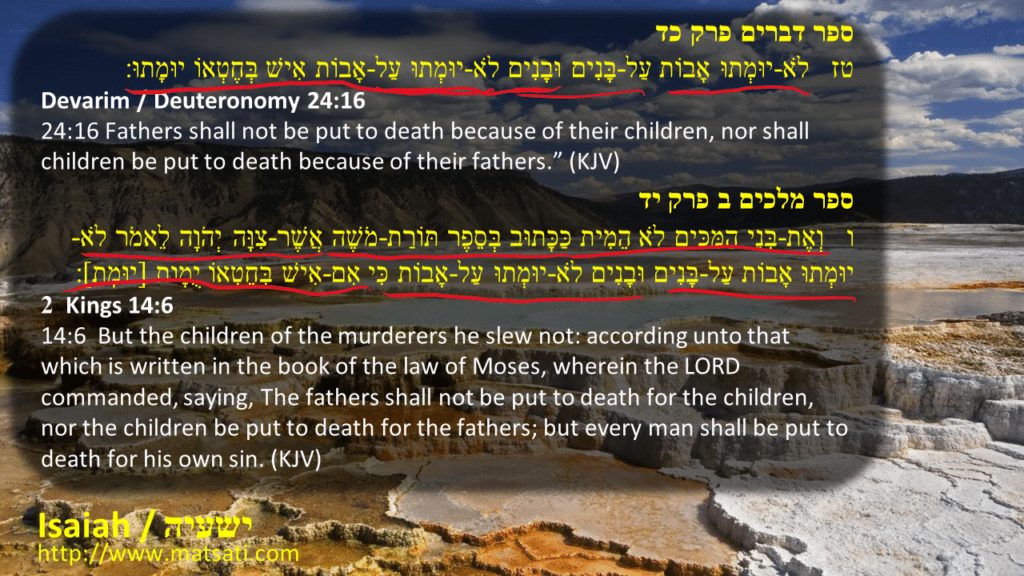
ספר דברים פרק כד
טז לֹא-יוּמְתוּ אָבוֹת עַל-בָּנִים וּבָנִים לֹא-יוּמְתוּ עַל-אָבוֹת אִישׁ בְּחֶטְאוֹ יוּמָתוּ:Devarim / Deuteronomy 24:16
24:16 Fathers shall not be put to death because of their children, nor shall children be put to death because of their fathers.” (KJV)
ספר מלכים ב פרק יד
ו וְאֶת-בְּנֵי הַמַּכִּים לֹא הֵמִית כַּכָּתוּב בְּסֵפֶר תּוֹרַת-מֹשֶׁה אֲשֶׁר-צִוָּה יְהֹוָה לֵאמֹר לֹא-יוּמְתוּ אָבוֹת עַל-בָּנִים וּבָנִים לֹא-יוּמְתוּ עַל-אָבוֹת כִּי אִם-אִישׁ בְּחֶטְאוֹ יֻמָות [יוּמָת]:
2 Kings 14:6
14:6 But the children of the murderers he slew not: according unto that which is written in the book of the law of Moses, wherein the LORD commanded, saying, The fathers shall not be put to death for the children, nor the children be put to death for the fathers; but every man shall be put to death for his own sin. (KJV)
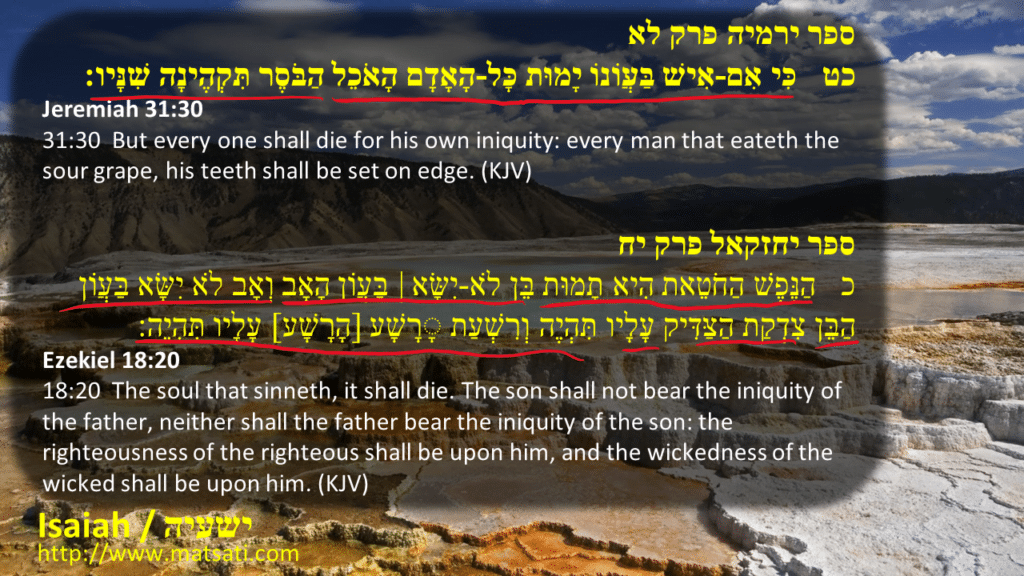
ספר ירמיה פרק לא
כט כִּי אִם-אִישׁ בַּעֲוֹנוֹ יָמוּת כָּל-הָאָדָם הָאֹכֵל הַבֹּסֶר תִּקְהֶינָה שִׁנָּיו:Jeremiah 31:30
31:30 But every one shall die for his own iniquity: every man that eateth the sour grape, his teeth shall be set on edge. (KJV)
ספר יחזקאל פרק יח
כ הַנֶּפֶשׁ הַחֹטֵאת הִיא תָמוּת בֵּן לֹא-יִשָּׂא | בַּעֲוֹן הָאָב וְאָב לֹא יִשָּׂא בַּעֲוֹן הַבֵּן צִדְקַת הַצַּדִּיק עָלָיו תִּהְיֶה וְרִשְׁעַת ָרָשָׁע [הָרָשָׁע] עָלָיו תִּהְיֶה:
Ezekiel 18:20
18:20 The soul that sinneth, it shall die. The son shall not bear the iniquity of the father, neither shall the father bear the iniquity of the son: the righteousness of the righteous shall be upon him, and the wickedness of the wicked shall be upon him. (KJV)
According to 2 Kings 14:6, Amaziah did not put to death the children of the murderers because of what is written in the Torah. Similarly we read in Jeremiah and Ezekiel, the son shall not suffer for the iniquity of the father, nor the father suffer for the iniquity of the son. We do read however that the sins of the fathers are punished in the children through the children learning the wicked ways of their parents, and so the sins of their fathers become the sins of the children. Therefore, the generations to come will in fact experience the penalty of the fathers’ sins because they too hate God. The point is when the father’s sins are visited on the children it is because the children are sinful just as their parents are sinful, doing the very same things. That is the wayin which the fathers’ sins are visited upon the children. The conclusion is that all judgment is deserved by the person who is punished. This is how Rashi interpretes these things according to parts 1-4 of his commentary.
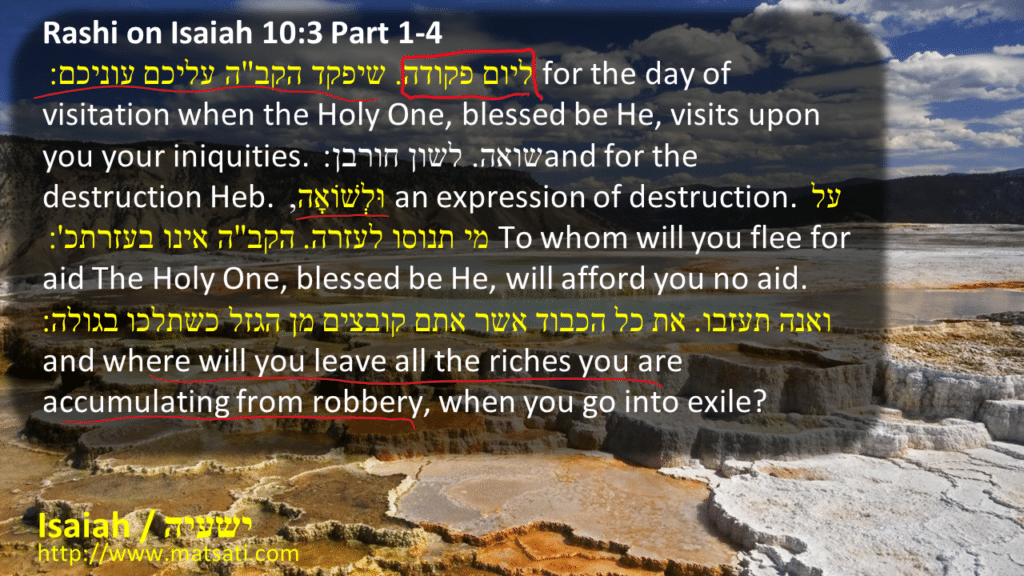
Rashi on Isaiah 10:3 Part 1-4
ליום פקודה. שיפקד הקב”ה עליכם עוניכם: for the day of visitation when the Holy One, blessed be He, visits upon you your iniquities. שואה. לשון חורבן: and for the destruction Heb. וּלְשׁוֹאָה, an expression of destruction. על מי תנוסו לעזרה. הקב”ה אינו בעזרתכ’: To whom will you flee for aid The Holy One, blessed be He, will afford you no aid. ואנה תעזבו. את כל הכבוד אשר אתם קובצים מן הגזל כשתלכו בגולה: and where will you leave all the riches you are accumulating from robbery, when you go into exile?
Rashi speaks of ליום פקודה “for the day of visitation” as that when the Lord God visits one’s iniquities upon him. Note that the location of salvation, one’s help (על מי תנוסו לעזרה to whom will you flee for help) one has reached a point of no return, the consequences are set and put into motion. This suggests to us that there is a period of time that God offers repentance, now is the day to repent, for tomorrow may be too late. This is how Peter understood these things saying according to 2 Peter 3:9, The Lord is not slack concerning His promise, as some count slackness, but is longsuffering toward us, not willing that any should perish but that all should come to repentance. (KJV) Once the time for repentance has ended, we read what happens according to Isaiah 10:4-5. ד בְכֵין בַר מִן אְרַעכֹון אְסִירִין תִתאַסרוּן וּבָר מִקִרוֵיכֹון קְטִילִין תִתרְמֹון בִכָל דָא לָא תָבוּ מֵחֹובֵיהֹון דִיתוּב רוּגזֵיה מִינְהֹון וְעַד כְעַן מְתַקְפִין מִרדֵיהֹון וְעֹוד מַחְתֵיה עְתִידָא לְאִתפְרָעָא מִנְהֹון׃ 10:4 Therefore out of your land ye shall be fettered amongst the captives; and out of your cities ye shall be cast out slain. For all this they do not turn away from their sins, that His anger might turn away from them; but still they hold fast their rebellion, and yet His stroke will be to take vengeance on them. ה יֵי אַתוּרָאָה שֻלטַן רוּגזִי וּמַלאַך שְלִיַח מִן קֳדָמַי עְלֵיהֹון בִלווָט׃ 10:5 Woe to the Assyrian, the government of my fury, an angel is sent from me against them for a curse! (TgJ) We note the divine hand on the punishment following the end of the time of repentance which is indicated by the rabbinic interpretation that an angel is sent from God carrying the curse. The rabbis interpret all of these events as being a means for man to recognize his sin and repent, according to Derashot HaRan 9:14.
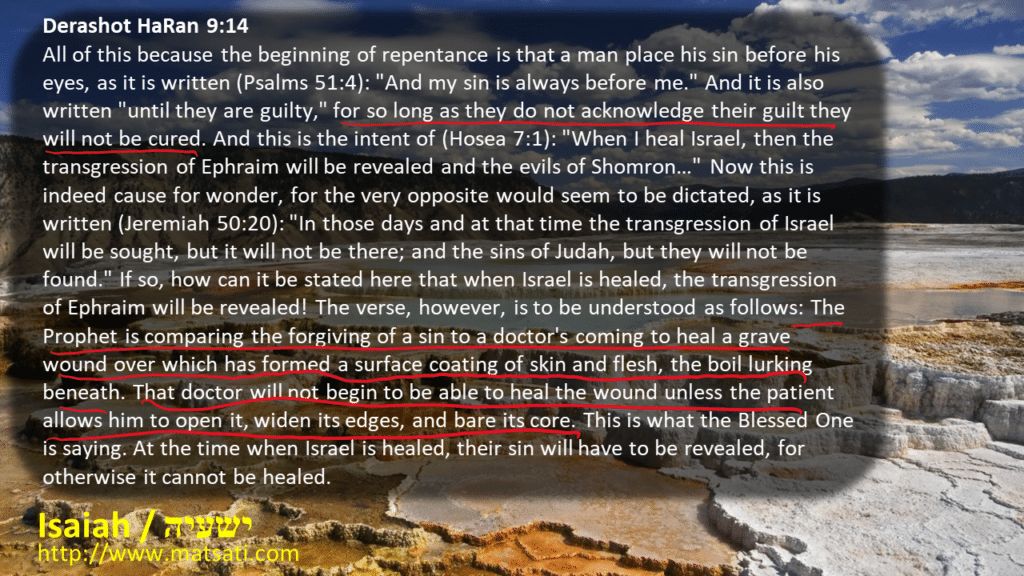
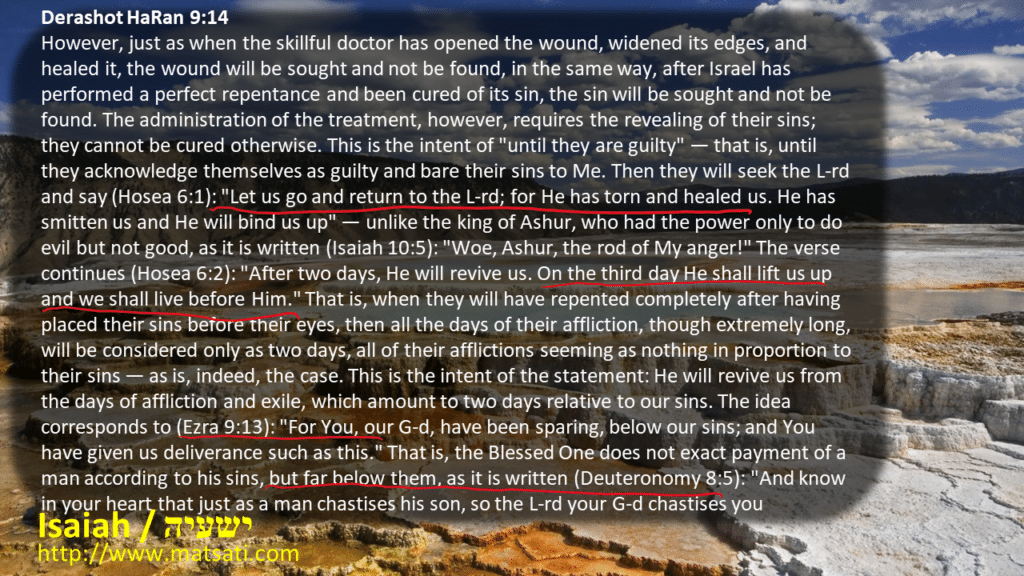
Derashot HaRan 9:14
ולפיכך מפני שהתחלת החשובה הוא שישים אדם עונו לנגד עיניו, כמש”ה וחטאתי נגדי תמיד, ואמר ג”כ עד אשר יאשמו, שכל עוד שלא נגלה עונם להם לא תעל ארוכתם, והוא מ”ש הכתוב (הושע ז) כרפאי לישראל ונגלה עון אפרים וכו’, וזה דבר של תימה לפי שראוי שיתחייב ההפך כמש”ה (ירמיהו ג׳:י״ח) בימים ההם ובעת ההיא יבוקש את עון ישראל ואיננו וגו’, וא”כ איך יאמר שכאשר ירפא יגלה עון אפרים, אבל פי’ הכתוב כך הוא שהנביא המשיל סליחת העון ברופא אחד שבא לרפאות מכה אנושה קרס עליה עור ובשר מלמעלה ותחתיה תעמוד הבהרת, והרופא הזה א”א שירפא המחלה היא בשום פנים אם לא שיפתחנה וירחיב שפתותיה ויגלה רעתה, כן אמר הש,י כי בעת ההיא שירפא ישראל יתחייב שיגלה עונם ובזולת זה לא יתעלה ארוכתם. אמנם גם כמו הרופא המלאכותיי יפתח הנגע ההיא וירחיב שפתותיה ויגלה רעתה, כן אמר הש”י כי בעת ההיא יבוקש עון ישראל ואיננו, אבל בעת קבלתם הרפואה יחוייב שיגלה, וא”א בזולת זה בשום פנים, וזה שה”כ עד אשר יאשמו, כלומר שיחזיקו עצמם כאשמים יגלו לפני עונם ואז יבקשו את ה’ ויאמרו לכו ונשובה אל ה’ כי הוא טרף וירפאנו וגו’, כלו’ לא כמלך אשור שלא היה יכולת בידו כ”א להרע ולא להטיב כמ”ש הכתוב הוי אשור שבט אפי. ואמר אחריו יחיינו מיומים וגו’, כלומר כשישובו בתשובה שלימה וישימו עונם נגד עיניהם יחשבו כל ימי צרתם ואם ארכו מאד ליומים מפני שכל יסוריהן כאין וכאפס כשיעריכו אל עונותיהם (וכן בדין), ולפיכך אמר שהוא יחיינו מימי הצער והגלות שהם נחשבים אצלנו בערך עונותינו ליומים, כמ”ש הכתוב (עזרא ט) כי אתה אלהינו משכת למטה מעונינו ונתתה לנו פליטה כזאת, ר”ל כי לעולם הש”י אינו נפרע מן האדם לפי עונותיו אבל למטה מהם מאד, וכמ”ש הכתוב (דברים ח׳:ה׳) וידעת עם לבבך כי כאשר ייסר איש את בנו וגו’:
All of this because the beginning of repentance is that a man place his sin before his eyes, as it is written (Psalms 51:4): “And my sin is always before me.” And it is also written “until they are guilty,” for so long as they do not acknowledge their guilt they will not be cured. And this is the intent of (Hosea 7:1): “When I heal Israel, then the transgression of Ephraim will be revealed and the evils of Shomron…” Now this is indeed cause for wonder, for the very opposite would seem to be dictated, as it is written (Jeremiah 50:20): “In those days and at that time the transgression of Israel will be sought, but it will not be there; and the sins of Judah, but they will not be found.” If so, how can it be stated here that when Israel is healed, the transgression of Ephraim will be revealed! The verse, however, is to be understood as follows: The Prophet is comparing the forgiving of a sin to a doctor’s coming to heal a grave wound over which has formed a surface coating of skin and flesh, the boil lurking beneath. That doctor will not begin to be able to heal the wound unless the patient allows him to open it, widen its edges, and bare its core. This is what the Blessed One is saying. At the time when Israel is healed, their sin will have to be revealed, for otherwise it cannot be healed. However, just as when the skillful doctor has opened the wound, widened its edges, and healed it, the wound will be sought and not be found, in the same way, after Israel has performed a perfect repentance and been cured of its sin, the sin will be sought and not be found. The administration of the treatment, however, requires the revealing of their sins; they cannot be cured otherwise. This is the intent of “until they are guilty” — that is, until they acknowledge themselves as guilty and bare their sins to Me. Then they will seek the L-rd and say (Hosea 6:1): “Let us go and return to the L-rd; for He has torn and healed us. He has smitten us and He will bind us up” — unlike the king of Ashur, who had the power only to do evil but not good, as it is written (Isaiah 10:5): “Woe, Ashur, the rod of My anger!” The verse continues (Hosea 6:2): “After two days, He will revive us. On the third day He shall lift us up and we shall live before Him.” That is, when they will have repented completely after having placed their sins before their eyes, then all the days of their affliction, though extremely long, will be considered only as two days, all of their afflictions seeming as nothing in proportion to their sins — as is, indeed, the case. This is the intent of the statement: He will revive us from the days of affliction and exile, which amount to two days relative to our sins. The idea corresponds to (Ezra 9:13): “For You, our G-d, have been sparing, below our sins; and You have given us deliverance such as this.” That is, the Blessed One does not exact payment of a man according to his sins, but far below them, as it is written (Deuteronomy 8:5): “And know in your heart that just as a man chastises his son, so the L-rd your G-d chastises you.”
The rabbinic interpretation is that the events in our lives are meant for a purpose, one of the primary purposes is to be humble and repentant of our sins. The idea is unless we confess/admit our guilt before God, there will be no forgiveness or cure from what is happening. We note a story from Matthew the speaks to this event, of illness and sin according to Matthew 9:2-8.
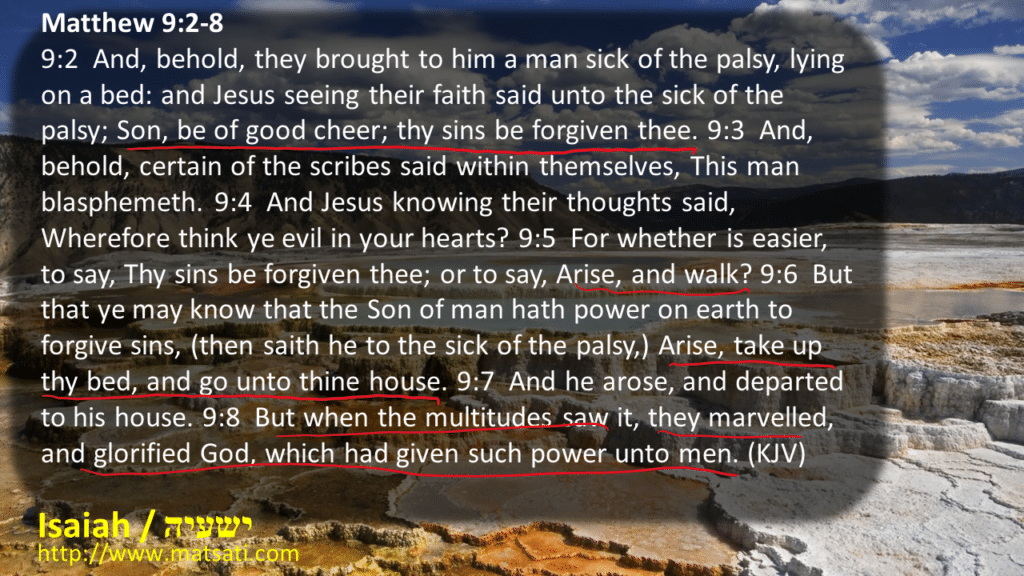
Matthew 9:2-8
9:2 And, behold, they brought to him a man sick of the palsy, lying on a bed: and Jesus seeing their faith said unto the sick of the palsy; Son, be of good cheer; thy sins be forgiven thee. 9:3 And, behold, certain of the scribes said within themselves, This man blasphemeth. 9:4 And Jesus knowing their thoughts said, Wherefore think ye evil in your hearts? 9:5 For whether is easier, to say, Thy sins be forgiven thee; or to say, Arise, and walk? 9:6 But that ye may know that the Son of man hath power on earth to forgive sins, (then saith he to the sick of the palsy,) Arise, take up thy bed, and go unto thine house. 9:7 And he arose, and departed to his house. 9:8 But when the multitudes saw it, they marvelled, and glorified God, which had given such power unto men. (KJV)
Here the healing of this man with palsy was achieved through the forgiveness of his sins. The natural conclusion was that it was because of his sin this illness had taken place. It is interesting, in other places, we read that illness is not always the outcome of one’s sin. (see John 9:1-12) The rabbis go on saying that before healing comes sin must be revealed. The analogy is to a doctor who comes to work on a wound, unless the person allows the doctor to open the wound and work on it, healing will not come. This is what God is doing in our lives, we must confess what we have done. This is analogous to our telling the Lord God everything that we have done, not attempting to hide our iniquity. The idea is that we must acknolwedge ourselves as being guilty before God, and only then will healing and forgiveness come. This is the intent of trusting in the Lord God in heaven, and in His Messiah Yeshua, to work, to forgive, and to provide deliverance. The point is that what we read in Devarim / Deuteronomy 8:5
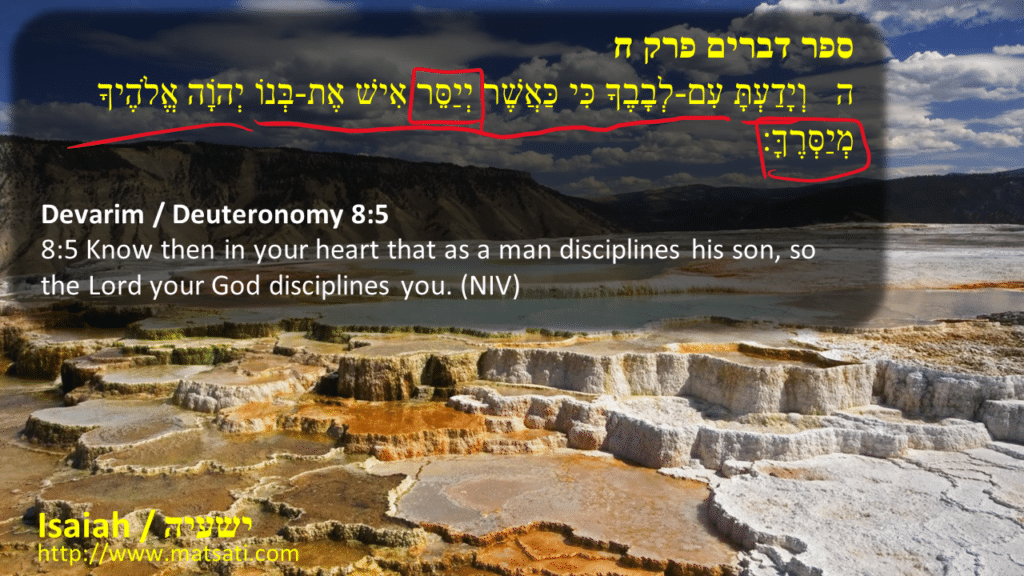
ספר דברים פרק ח
ה וְיָדַעְתָּ עִם-לְבָבֶךָ כִּי כַּאֲשֶׁר יְיַסֵּר אִישׁ אֶת-בְּנוֹ יְהוָֹה אֱלֹהֶיךָ מְיַסְּרֶךָּ:
Devarim / Deuteronomy 8:5
8:5 Know then in your heart that as a man disciplines his son, so the Lord your God disciplines you. (NIV)
This is the outcome of what Isaiah says, י כְמָא דְאַשכַחַת יְדִי מַלכְווָן דִי פָלְחָא לְטָעְוָתָא וּצַלמָנֵיהֹון מָא שְנֹו מִירוּשלַם וּמִשֹמְרֹון׃ 10:10 As my hand hath found the kingdoms which worship idols, although their images were more than those of Jerusalem, and their statues more than those of Samaria; יא הְלָא כְמָא דַעְבַדִית לְשֹמְרֹון וּלטָעְוָתַהָא כֵין אַעְבֵיד לִירוּשלַם וּלצַלמָנַיָא דְבַה׃ 10:11 Shall I not, as I have done to Samaria and to her idols, so do to Jerusalem and to her idols? (TgJ) An unrepentant lifestyle brings with it a Torah based principle that we read according to Devarim / Deuteronomy 8:5. The significance of this is that today is the day of repentance, and in Yeshua we have the forgiveness of sins, if we are willing to humble ourselves, confess our sins, and trust / believe that through the work of Yeshua the Messiah our Father in heaven will forgive our sins!
